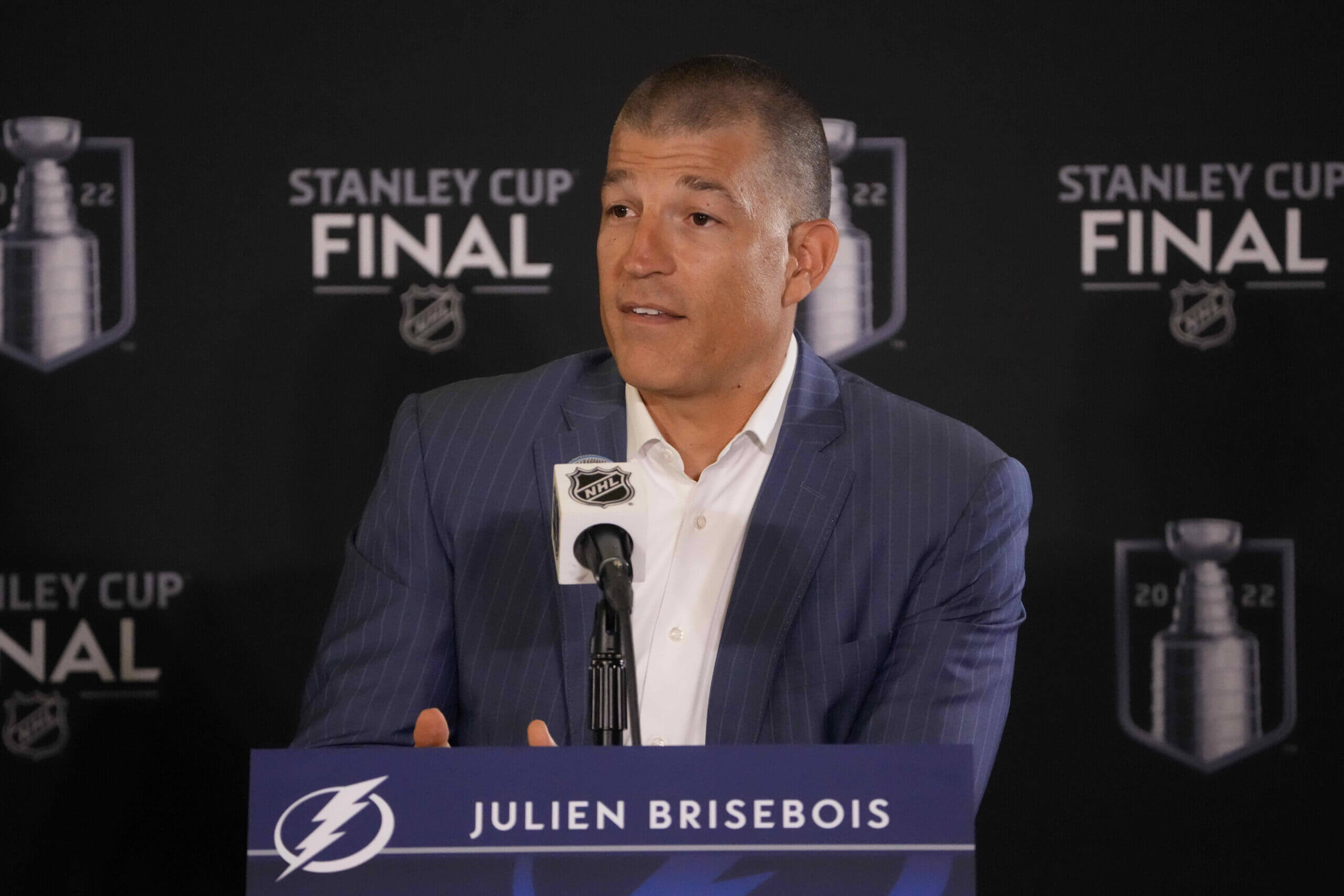At the intersection of brotherly love and heartless business, the Tampa Bay Lightning found themselves splitting up one of the NHL’s closest, most successful and longest-running duos this week.
Victor Hedman hadn’t yet fully realized Steven Stamkos had become a free agent as he signed a four-year, $32 million contract extension with the Lightning on Tuesday.
You’ve never seen a guy so depressed after landing a big contract that runs until his late 30s. Hedman couldn’t even smile.
“It’s obviously very sad to see your friend leave and go play somewhere else,” he said from his off-season home in Sweden.
They had played together since 2009, each appearing in more than 1,200 games for the Lightning and twice kicking off the team’s Stanley Cup run after reaching the pinnacle of the sport.
Stamkos and Hedman encouraged each other to train hard and carried their competitive nature onto the golf course whenever free time permitted. They grew up together, attended each other’s weddings, started families and never dreamed that one day Stamkos would sign with the Nashville Predators while Hedman would receive a contract with the Lightning on the same terms.
“It’s going to be hard to imagine walking into our locker room and going to Amalie Arena and not seeing him on the ice,” Hedman said. “It’s going to be super, super weird.”
Truth be told, things had been a little weird between Stamkos and Lightning management for some time.
This helps explain how we reached a breaking point.
Stamkos still doesn’t fully understand why general manager Julien BriseBois let all of last summer go by without even addressing the issue of a possible extension — a frustration the Lightning captain expressed publicly on the opening day of training camp in September.
Looking back on signing his own four-year, $32 million contract with the Predators on Monday, Stamkos identified it as the beginning of the end.
Or, as he puts it: “The beginning of the writing on the wall.”
The two sides nonetheless began a series of negotiations during the offseason that stretched into last week. They explored several contract ranges and possibilities before ultimately settling on a long-term deal that would keep the AAV as low as possible and preserve the club’s ability to manage the salary cap.
BriseBois is a decisive thinker who is not afraid to make unpopular or unorthodox decisions, many of which helped build those Cup-winning teams in 2020 and 2021.
While he has a deep understanding of who Stamkos is and how much he means to Tampa — “I would say he’s probably the best spokesperson in the league for an organization,” BriseBois said. “He’s incredibly articulate, authentic, honest, thoughtful and insightful” — the GM approached contract negotiations with a clear vision of how Stamkos’ next deal would fit into the Lightning’s bigger picture and didn’t stray from that.
“Ultimately, there were different scenarios and structures and ways to put a contract together that I felt were in the best interest of the organization,” BriseBois said. “There were a number of scenarios that could have worked. Steven had a number of contracts that could have worked for him, but ultimately there was no overlap, and that’s why we weren’t able to get a deal done.”
The Lightning’s best offer over an eight-year span was around $3 million in average annual value, far less in total than what Stamkos received on his four-year contract from Nashville.

GO FURTHER
LeBrun: How the Predators won NHL free agency, landing the hat trick of Stamkos, Marchessault and Skjei
It’s not entirely fair to compare apples to apples.
What he would have agreed to stay in Tampa and what he was looking for on the open market were two different things, Stamkos said.
“When you’re in one place for a long time, you’re always trying to make it work and stay, and there’s give and take on both sides,” he said. “So it was a completely different situation than being a free agent on the open market and teams really going out of their way to show how important you would be if you could be part of their organization.”
Stamkos was ready to make his club an offer. But as free agency approached on July 1, he felt like he was being asked to give more than he would get in return.
“That’s the hardest part, is trying to hold on to something that maybe isn’t trying to hold on to you,” he lamented.
Contrast that with how the organization handled the Hedman situation, re-signing him one year shy of full-time free agency. The Lightning did the same thing with the big defenseman in 2016 after letting Stamkos become an unrestricted free agent two days before, and the organization even took a different approach to their second NHL contracts before that.
With former general manager Steve Yzerman at the helm, Stamkos’ entry-level contract was allowed to expire in 2011 even though he already had a 50-goal season under his belt, and Hedman signed an extension with seven months left on his contract.
It’s more a philosophical question than anything personal: The Lightning are betting that a 6-foot-7 defenseman who skates like the wind and has played 20-plus minutes per game for 15 straight seasons is harder to replace than a sniper coming off a 40-goal campaign at age 33 who must continue to produce offensively to be effective.
BriseBois explained that Hedman’s situation is the exception rather than the rule, noting that most NHL stars in recent years have had to wait until their fourth contract rather than sign an early extension – citing Patrice Bergeron, Alex Ovechkin, Evgeni Malkin, Kris Letang, Joe Pavelski and Claude Giroux as examples.
Additionally, Tampa Bay believes it has already found its replacement for Stamkos by signing Jake Guentzel to a seven-year, $63 million contract on Monday. He is five years younger than the departing captain and a proven big-game scorer who BriseBois believes will fit in well with the team’s culture.
“He’s a Bolt that hasn’t played for the Bolts in the past,” BriseBois said. “Today, we kind of remedied that.”

Julien Brisebois stepped up quickly to replace Steven Stamkos’ attack when a signing became untenable. (Ron Chenoy/USA Today)
While that wasn’t how Stamkos and Lightning management envisioned it, they remained incredibly respectful in describing the circumstances that led to the split.
BriseBois congratulated Stamkos on his upcoming induction into the Hall of Fame and wished his family happiness. Stamkos expressed gratitude for the “first-class” welcome he received from the organization and the city.
“The memories I had in Tampa will outweigh any resentment or feelings I may have had throughout this process,” Stamkos said. “These are temporary decisions. These are emotional decisions, and you know over time they usually go away.”
What will remain intact is his bond with Hedman, even if only one of them will be lucky enough to spend their entire career with the Lightning.
“Before we were teammates, we were great friends and we always will be,” Hedman said. “In the best case scenario, yes, we would have liked to finish our careers in Tampa and together. But this hockey is a business at the end of the day.”
(Top photo of Steven Stamkos and Victor Hedman: Christian Petersen/Getty Images)